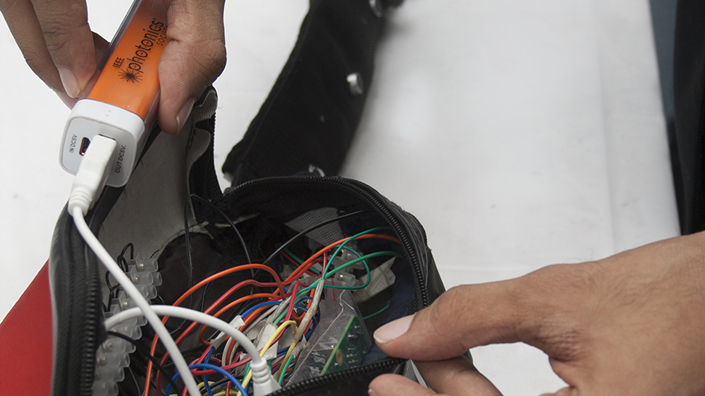Institution news
A team of Sri Lankan university students and engineers have won the IMechE Asia Pacific Design Competition for people who are deaf or hard of hearing with their ‘i-belt’ invention; a lightweight wearable waist belt consisting of mini vibrators and microphones.
The competition, run by IMechE and held at Callaghan Innovation, aims to address real-world problems through engineering design projects with the challenge this year to develop a solution for deaf people.
This year’s winner, the i-belt, contains an inbuilt voice recognition system capable of reacting to known sounds, quickly alerting the wearer through a special pattern of vibration. The device works by picking up the accurate direction of the source of the noise or sound, translates this to a vibration in the belt that corresponds to the direction of the loud noise.
The team from University of Moratuwa – comprising of final year undergraduates Eranga De Silva, Hasala Sakvithi Rohanawansha and Peshan Sampath – entered to the competition under the guidance and supervision of Dr. Ranjith Amarasinghe, a senior lecturer from the Mechanical Engineering Department.

The winning entry was selected by Auckland Deaf Society’s recently appointed board member Mike Granger. Profoundly deaf since birth, he is also an engineer at consultancy BECA, where he has worked for the past 35 years as a Revit model designer.
Granger said: “The i-belt device is a great solution for deaf people, alerting them in an emergency if there’s a loud noise, if someone is at the door, or calling their name.
“I’ve had many near miss accidents where I didn’t realise that emergency vehicles were passing nearby, couldn’t hear my daughters calling me, or see the doorbell or smoke alarm flash at home if I was outside or in a different room. The i-belt solves all these things.”
Second and third places went to teams from Hong Kong for their filtering system for use in an office environment and a team from China for their device which would predominantly assist people to get the appropriate information whilst on public transport.
All three finalists are looking to further develop their devices and then launch to market, initially in their home countries, but once developed, would be looking to expand their presence.
Professor Alan Lau, IMechE International Strategy Board chairman, added: “All contestants presented very well and confident to introduce their design and idea to judging panel, and other members.
“Almost all designs were very good and it was a hard job for the panel to make a decision which one is the best. The contestants although they are so young and fresh, their product design logic was very mature and did consider the need of users. They conducted many trails in their home countries before coming to the competition, so, they actually taught us a lot about how the feeling of people who have hearing impairment and their difficulties in dealing with daily life operation.
Professor Lau added: “I would like to express my heartfelt congratulations to all contestants, who joined this competition. IMechE is always willing to provide this kind of platforms to support our international young members, and train them to become all-rounded professional engineers.”
To find out more the IMechE Southern Asia Region go to nearyou.imeche.org.